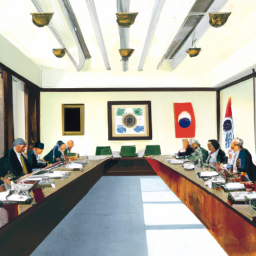In recent discussions surrounding diplomatic relations between India and Pakistan, a significant statement emerged from Laloo Prasad Yadav, a prominent Indian politician. He emphasized that the intention of Indian leaders visiting Pakistan was not to engage in derogatory remarks or abuse towards the neighboring country. This assertion raises important questions about the nature of political dialogue and the complexities of India-Pakistan relations. In my experience observing political discourse, it is evident that the rhetoric surrounding India and Pakistan is often charged with historical grievances and national pride. Yadavs comments reflect a broader sentiment that seeks to move beyond hostility and foster a more constructive dialogue. The historical context of India-Pakistan relations is fraught with conflict, stemming from partition in 1947, territorial disputes, and ongoing tensions over issues such as Kashmir. These factors have created an environment where political leaders must navigate a delicate balance between national security concerns and the need for diplomatic engagement. Yadavs assertion can be seen as an attempt to shift the narrative from one of animosity to one of potential collaboration. Experts agree that fostering a respectful dialogue is essential for any meaningful progress in bilateral relations. According to political analysts, the tone of communication between nations can significantly impact public perception and diplomatic outcomes. Research shows that constructive dialogue often leads to improved relations and can pave the way for collaborative efforts in areas such as trade, security, and cultural exchange. The importance of respectful communication is underscored by the fact that both nations have a shared history and cultural ties that can serve as a foundation for improved relations. For instance, many families are divided by the border, and cultural exchanges have historically played a role in bridging divides. As observed in various instances, initiatives such as cricket diplomacy have shown that sports can serve as a unifying force, fostering goodwill and understanding between the two nations. However, the road to improved relations is fraught with challenges. According to official reports, incidents of cross-border terrorism and military skirmishes continue to strain relations. These events often lead to heightened tensions and a resurgence of nationalist sentiments on both sides, complicating efforts to engage in constructive dialogue. Political leaders must navigate these challenges carefully, as any misstep can quickly escalate into a diplomatic crisis. In light of these complexities, Yadavs comments can be interpreted as a call for a more nuanced approach to diplomacy. Industry experts note that establishing a framework for dialogue that prioritizes mutual respect and understanding is crucial. This involves acknowledging historical grievances while also recognizing the potential for collaboration in areas of mutual interest. For example, both nations face common challenges such as climate change, economic development, and regional security threats, which could serve as starting points for dialogue. Moreover, the role of media in shaping public perception cannot be overlooked. Transparent reporting and responsible journalism are essential in fostering an environment conducive to dialogue. Fact-checked information and balanced perspectives can help counteract sensationalism and promote a more informed public discourse. As observed in various media narratives, the portrayal of India-Pakistan relations often oscillates between conflict and cooperation, highlighting the need for responsible reporting that emphasizes the potential for positive engagement. Looking ahead, the implications of Yadavs statement are significant. If political leaders can successfully shift the narrative towards one of respect and collaboration, there may be opportunities for renewed dialogue and cooperation. Experts predict that such an approach could lead to incremental improvements in relations, ultimately benefiting both nations and the broader region. However, this will require sustained commitment from political leaders and a willingness to engage in difficult conversations. In conclusion, Laloo Prasad Yadavs assertion that Indian leaders did not visit Pakistan to abuse them highlights the need for a more respectful and constructive dialogue between the two nations. As observed, the historical context of India-Pakistan relations is complex, but there is potential for collaboration if leaders prioritize mutual respect and understanding. The challenges are significant, but with careful navigation and a commitment to transparent communication, there is hope for a more positive trajectory in bilateral relations. The future of India-Pakistan relations may depend on the ability of leaders to foster a dialogue that transcends historical grievances and focuses on shared interests and common goals.
TRENDING NOW
WORLD
Global Messaging Trends: Can Local Apps Like Arattai Overtake Giants?
44% 🔥
POLITICS
Accusations fly over whether Republicans or Democrats 'own' shutdown
35% 🔥
POLITICS
Rep. Mike Haridopolos, R-Fla., talks about the government shutdown
34% 🔥
POLITICS
What happens now that the government has shut down. And, a pricing deal with Pfi...
26% 🔥
POLITICS
Married, but no connection: Reality of silent divorces in Indian homes
31% 🔥
POLITICS
Netanyahu's apology to Qatar, phone on Trump's lap: A telling White House photo
38% 🔥
MOST READ
SPORTS
Week 5 NFL odds, lines, betting picks, spreads: 2025 predictions: Model backs Sa...
55% 🔥
SPORTS
Predicting every undefeated college football team's first loss: Will anyone beat...
36% 🔥
SPORTS
Tigers Lefty Tarik Skubal Deserves Second Straight AL Cy Young Award
54% 🔥
SPORTS
Jets Get Official Braelon Allen Injury Diagnosis
61% 🔥
SPORTS
Gill: India won't be 'looking for any easy options' against West Indies
49% 🔥
SPORTS
Phil Mickelson takes a jibe at golf during friendly banter with ex-LIV Golf CEO’...
39% 🔥

